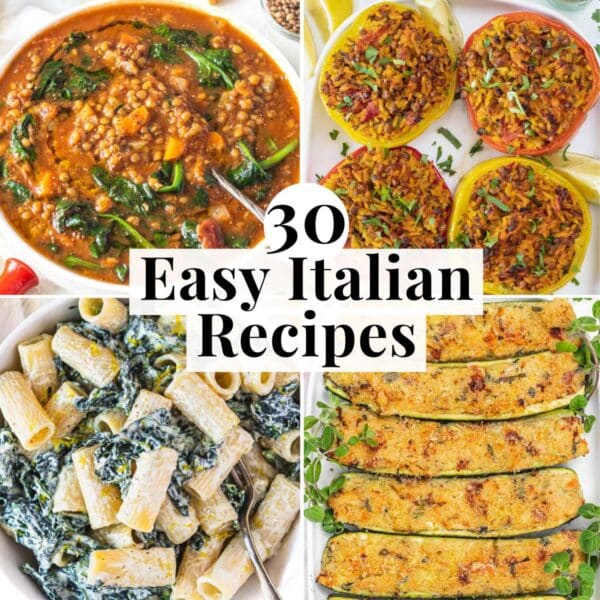You’ll love the comforting Italian flavors, the sauce’s creamy texture, and the ricotta and tomatoes’ lightness. This creamy tomato pasta is excellent for the whole family’s weeknight lunch or dinner. Don’t have time to read the full blog post? JUMP TO RECIPE HERE!
What is a creamy tomato pasta?
Ingredients and substitutions for creamy tomato pasta
How to make creamy red tomato pasta
Serving suggestions
Variations
Storage & Make Ahead
More creamy pasta recipes
More pasta sauce recipes
Using ricotta instead of heavy cream makes this recipe creamier, lighter, and tastier, and there’s no need to cook the sauce! Italians, especially Sicilians, often use ricotta with pasta as a sauce or for stuffing. Have a bite, and you’ll learn why. It tastes divine. The grated parmesan adds a rich, savory flavor, and the fresh basil adds a mild, sweet, and vibrant taste, making this creamy tomato pasta unmistakeably Italian. For vegans: substitute our vegan ricotta and vegan parmesan for their dairy counterparts. Similar recipes: roasted red pepper pasta, casarecce pasta, paccheri pasta, kale pasta.
Pasta
In Sicily, this pasta is often made with casarecce, a short pasta type slightly twisted and rolled lengthways. Substitute any other pasta shape for casarecce. For example, we love the creamy tomato sauce with trofie, orecchiette, cavatelli, farfalle, rotini, fusilli, paccheri, and penne pasta.
Creamy tomato pasta sauce
Tomatoes: we recommend ripe vine tomatoes or Roma tomatoes. Ricotta cheese: you can use part-skim, low-fat, whole-milk ricotta, or vegan ricotta. Parmesan cheese: you can use grated parmesan cheese or vegan parmesan. If you like splurging, go for Italian Parmigiano Reggiano or Grana Padano. Extra virgin olive oil Fresh basil leaves Nuts: you can use pine nuts, almonds, walnuts, or macadamia nuts. We used pine nuts. Garlic: we recommend a fresh garlic clove, but garlic powder works too. Salt and freshly ground black pepper. Add a pinch of red pepper flakes to make it spicy.
1. Cook the pasta
Bring a large pot of water to a boil. When the water boils, add the salt and the dried pasta. Cook the pasta according to the package directions or until it is al dente—cooked but with a chewy bite. Reserve 1 cup of the cooking water, drain the pasta, and add it to a large mixing bowl with the creamy tomato sauce.
2. Make the creamy tomato sauce
While the pasta cooks, make the creamy pasta sauce. Cut the tomatoes in half and discard their seeds and juice. This is important; otherwise, the sauce will be too watery. Add the tomatoes to a food processor or blender with basil leaves, pine nuts, grated parmesan cheese (or vegan parmesan), ricotta cheese (or vegan ricotta), a small garlic clove, extra virgin olive oil, salt, and black pepper. Pulse a few times or until creamy. You might need to scrape down the sides of the food processor once or twice. Taste and adjust for salt before mixing the sauce with the pasta.
3. Mix the sauce with the pasta
Pour the creamy tomato sauce into a large mixing bowl. Add the cooked pasta and toss until well combined. If the sauce is too thick, add a few tablespoons of reserved pasta cooking water until you reach your desired consistency. Portion the pasta on a plate and garnish with fresh basil leaves and a drizzle of oil. Serve immediately.
Kale salad Pear salad Cucumber tomato salad Green bean salad Zucchini salad Simple side salad Air fryer eggplant
Kale Salad
Zucchini Salad
Cucumber Tomato Salad
Pear Salad
Reserve some pasta cooking water: when mixing the pasta with the creamy tomato sauce, you might need to add some pasta cooking water to bring all the ingredients together, add creaminess, and reach your desired sauce consistency. Refrigerator: Keep the sauce in an airtight container for four days. If you have leftover pasta, keep it in the fridge for 24 hours. Freezer: You can freeze the sauce in an airtight container, like a small jar, for up to 3 months. Avoid freezing leftover pasta. Reheat: Warm leftovers in the microwave, or eat at room temperature.
Mushroom Alfredo
Broccoli Pasta
Lemon Ricotta Pasta
Cherry Tomato Pasta
Lentil Bolognese
Mushroom Ragu
Marinara Sauce
Red Pepper Pasta
30 Easy Italian Recipes
45 Easy Vegetarian Dinner Recipes
30 High Protein Vegetarian Meals
45 Easy Pasta Recipes
































